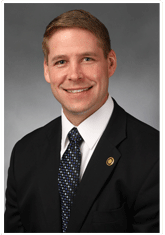JEFFERSON CITY — Over the last two months, I have detailed the case for tax reform in Missouri. Those previous Capitol Reports discussed why certain taxes are harmful and the need to choose the right mix of taxes. They laid out a case for tax reform as economic development, where businesses can be attracted to Missouri and state revenues can actually increase. They discussed the difference between Missouri’s tax structure and those of our neighboring and high-growth states.
The reports also showed how Missouri is falling behind in population growth, job growth and economic development. Missouri has lost three congressional districts since 1970, and has lost half its districts since 1930. We are currently ranked 47th in Gross Domestic Product (GDP) growth since 1997. And in the latest released GDP growth numbers for 2012, we grew only 2 percent, compared to the national average of 2.5 percent.
While not everyone will be swayed by the facts that have been presented, at the least, I hope everyone understands my position better. I truly hope even opponents of tax reform will see that supporters have a logical, detailed and well-researched position. We may disagree on the philosophy of tax reform, but there is no need to denigrate each other’s position or provide inaccurate information.
A total of 18 states reformed their taxes in some way in 2013. The longer Missouri waits to come up with a viable solution to reforming our tax structure, the further behind we get. We will lose more businesses, we will lose more jobs, we will lose more residents and we will lose more revenue.
As was clear in this month’s special session, Missouri needs to do more to attract more companies and more jobs to the state. My hope is to continue to provide universal opportunities, for all businesses and residents, rather than target one business at a time.
At this point, it is difficult to determine what a finished tax reform bill will look like in 2014. There are many ideas for improving on the 2013 bills. There are many options for reducing or reforming the corporate tax, personal income tax and small business pass through taxes. Options have been raised concerning the triggers, how to define small business, and how to assure funding for education. We will have a healthy debate about what type of cuts is best, which are most needed, which will generate the most economic activity and which are most feasible with the current Legislature and governor. I look forward to leading that debate in the Senate as the chair of the Ways and Means Committee.
On Dec. 1, I prefiled Senate Bill 509 as a base tax bill. It is likely to change as it goes through the process. It is similar in several ways to the finished House Bill 253 from the 2013 session. It cuts personal property taxes over a period of 10 years and ties that to a specific trigger, so the state must be growing for the cuts to take place. It offers an additional $1000 deduction on that tax for those making less than $20,000 – an often ignored part of the bill by people who claim it was only for the rich. It creates a new deduction for small businesses that pay taxes through their personal accounts, and it adds triggers to that section where they did not exist before, tying those cuts to state growth. It also includes a deduction aimed at the smallest corporations.
As always, I am working with other members of the Senate, members of the House, and proponents and opponents of tax reform. Together, I hope we can craft a final bill that will be acceptable to the governor. I have not turned down a meeting or conversation with anyone who reasonably wants to discuss the issue.
Please feel free to contact me with any questions or concerns at any time. We look forward to hearing your comments and suggestions and trying to answer any questions you may have. You can reach us by phone at 573-751-1464, or e-mail at will.kraus@senate.mo.gov.
|



